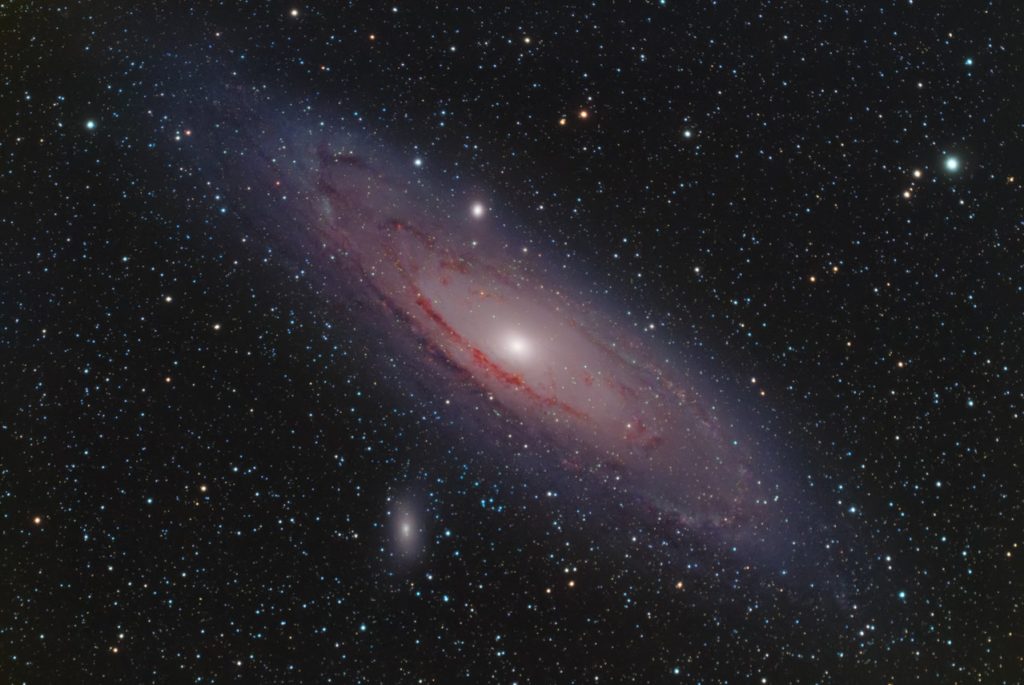
Where does space end? There is no way of knowing, but there is a horizon 46 billion light years away that we can’t see past.
There are five different possibilities. That the universe is infinite. That the universe wraps in on itself. That there is no “outside” to the universe. That our universe is embedded in something else. That the universe is finite but doesn’t have an “outside”.
We can see 46.1 billion light-years into the universe, in all directions. That means that we know for definite the universe is at least 92.2 billion light-years across. We can assume the universe is bigger than that because if it wasn’t, it would put us in the exact center of the universe, which is extremely unlikely. 46.1 billion light-years is a horizon, akin to our horizon on Earth. There is more beyond it, but that is as far as we can see. How did scientists arrive at the figure of 92.2 billion? Well, the European Space Agency’s Planck space mission released an incredibly detailed map of the universe, which showed that the universe is 13.8 billion years old. Because scientists know that the universe is expanding, any object that was 13.8 billion light-years away from us 13.8 billion light years ago, has moved on by 13.8 billion light-years. The speed at which the object moves is unknown, as the universe is not expanding at a uniform rate, but that spot could now be 27.6 billion light-years away. However, we that 27.6 billion would only be the distance if the object was the only thing moving, but it is not. The space between us and the object we are observing has also expanded. Scientists estimate that the universe is made up of 0.01% radiation in the form of photons, 0.1% neutrinos, 4.9% normal matter, 27% dark matter, and 68% dark energy. By knowing these ratios, they have calculated that the visible universe is 46.1 billion light-years in all directions.
So, where does space end? Let’s look at those five possibilities. The first possibility is that the universe is infinite. If it truly is infinite, then space doesn’t end and so there is nothing outside of space. It would just go on forever. We would travel to that horizon 46.1 billion light-years away and it would keep expanding as we got closer to it. We would never reach an end because there is no end. As humans, with our human brains, we have a lot of trouble imagining something that is infinite. We like to imagine the universe as a ball floating in something else, but that is just our way of making sense of it.
The second possibility is that the universe wraps in on itself. The universe could appear infinite without actually being infinite. It could extend out for trillions of light-years but be an enormous ball where all points come back to the point of origin. Imagine walking around our Earth. If you went in a straight line, you could keep going forever. If you didn’t recognize the points you passed, it would seem infinite.
The third possibility is that there is no “outside” of the universe. This comes down to definition. Universe means everything that exists in space and time. If this is the definition of universe, then whatever is outside the universe is also part of the universe. This means that the space cannot end because whatever is after the end, is also part of space.
The fourth possibility is that our universe is embedded in something else. The universe could be embedded in a multidimensional object. String theory posits that there are 10 dimensions. If that is true, our three-dimensional universe could be held in another dimension. There is no way of knowing if this is true and no practical way of testing it.
The fifth possibility is that the universe is finite, but there is no “outside”. We have no way of conceiving of something that is “nothing”. Everything we know is held in something else. My house has air around it. A submarine has water around it. The Earth has space around it. However, even space is not nothing. 1 cubic meter of space contains 0.3 atoms, along with radiation, protons, and maybe even dark energy. Space is not nothing. We don’t have the mental ability to conceive of nothing, but space may not have an end because space is all that there is. There is nothing after the end of space because there literally is nothing else. Possibly, asking the question “where does space end” is a ridiculous question because there is no “outside” of space, and we are trying to apply our human understanding to something that cannot be understood in that way.
So, where does space end? There is no way of knowing, but it is at least farther than 46 billion light-years. I doubt we will know in my lifetime. It would be nice if the human race worked it out one day, though. And that is what I learned today.
https://www.space.com/whats-beyond-universe-edge
https://theconversation.com/does-outer-space-end-or-go-on-forever-162333
https://www.space.com/24073-how-big-is-the-universe.html
https://astronomy.com/news/2021/02/what-shape-is-the-universe
https://www.space.com/more-universe-dimensions-for-string-theory.html
https://www.discovermagazine.com/the-sciences/taking-the-measure-of-nothing-in-the-universe
